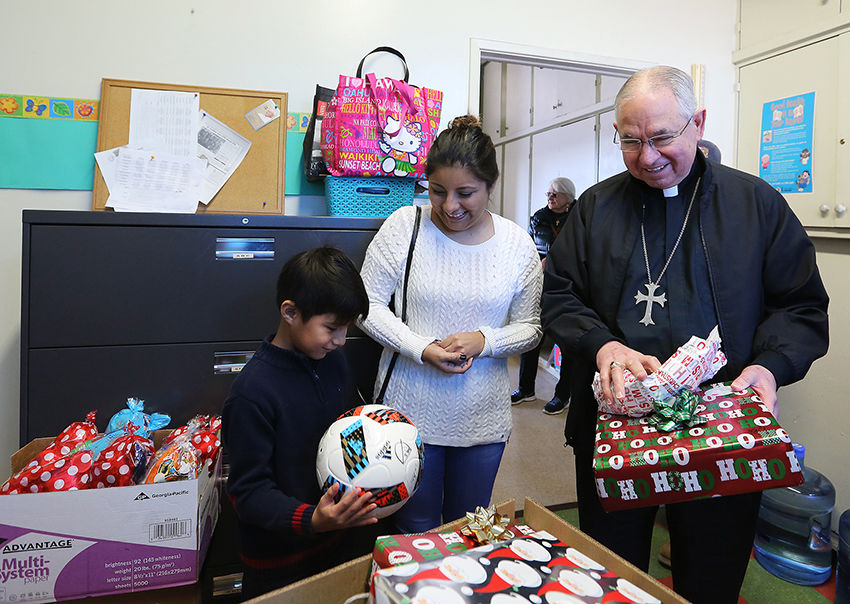St. John Paul II said at the beginning of his first Christmas message as pope: “Christmas is the feast of humanity.”
It is a beautiful expression and it brings us to the heart of the joyful mystery we celebrate.
Jesus Christ was one of many children born in the world on that first Christmas Day. He was one of the billions of babies who have been born ever since the world began.
It is interesting that at the time when Jesus was born, the government was taking a census. “In those days a decree went out from Caesar Augustus that the whole world should be enrolled. … So all went to be enrolled, each to his own town.”
The census is a curious detail in the Christmas story. I think this detail is meant to remind us how ordinary his birth was. He was just another child born to another working couple in an unnoticed corner of the Roman Empire. Jesus is a statistic, a number enrolled in the census. In fact, his family is so insignificant that they cannot even find room at the local inn, so their Child has to be born in a manger.
When I reflect on the census, I also think about the genealogy of Jesus from the New Testament that we hear in our liturgy during the final week of Advent. We are all familiar with this reading: “Abraham was the father of Isaac, and Isaac the father of Jacob, and Jacob the father of Judah and his brothers.”
We can be tempted to “tune-out” when we hear those verses. There is no drama, no action, just a listing of names. Until finally we hear: “Joseph the husband of Mary, of whom Jesus was born.”
What does it mean, why do we hear about all these ancestors of Jesus? I think the point is similar to the point of the census — to remind us how “ordinary” the birth of Jesus was.
The genealogy tells us that Jesus has true human roots, he has “people” he comes from. Just like you and just like me, and just like every other person.
Jesus came into this world just like you did and just like I did — he spent nine months in the womb of his mother and was born into a human family.
But there is nothing ordinary about Christmas.
Jesus descends from a long line of people, but he also comes down from heaven as the Son of God. Born at a moment when people were being counted by political authorities, Jesus shows us that every life “counts” and is precious in the eyes of God.
Jesus comes into the world as a number, one of many. But he comes to tell the world that every life has value; his message is that every person is unique and cannot be replaced or repeated.
At Christmas, we go with the shepherds to seek the Child wrapped in swaddling clothes and lying in the manger.
And in this Child that we find in the manger on Christmas Day, we find the meaning of our lives. In the face of this Child, we see the face of God. But we see something more. We see ourselves. We see who we are, and see who we are made to be.
That is why Christmas is the “feast of humanity.”
St. Paul said the human person, alive and thriving, is the image and glory of God. This is the beautiful, joyful truth that Jesus reveals at Christmas.
Jesus comes to be born a Son of Mary — and he comes to show us that we are born to be sons and daughters of God, made in his image and likeness.
This is who we are: children of God, made like him — to share in the blessedness and holiness of his own life, to live as saints and children of God in his family, the Church.
God created us out of love and he has a beautiful plan for our lives. This is what Jesus comes to tell us. This is the good news. It is amazing to think how much he loves us! What dignity, what great powers and possibilities he has given us for our lives!
This Christmas, it is time for us to rediscover the beautiful truth about our lives, the beautiful vision of the human person that we find at the heart of the Gospel.
This is my prayer for you this Christmas. I pray that we will be renewed in wonder, in sincere amazement at God’s love for us, a love that knows no limit. Pray for me, too, that together we will be renewed in Christmas joy.
I wish you and your families a blessed and holy Christmas filled with the joy of laughter and a beautiful hope.
Let us ask our Blessed Mother Mary to help us to make the birth of her son a new birth, a new beginning, for you and for me, and for the whole world.
You can follow Archbishop Gomez daily via Facebook, Twitter and Instagram.

